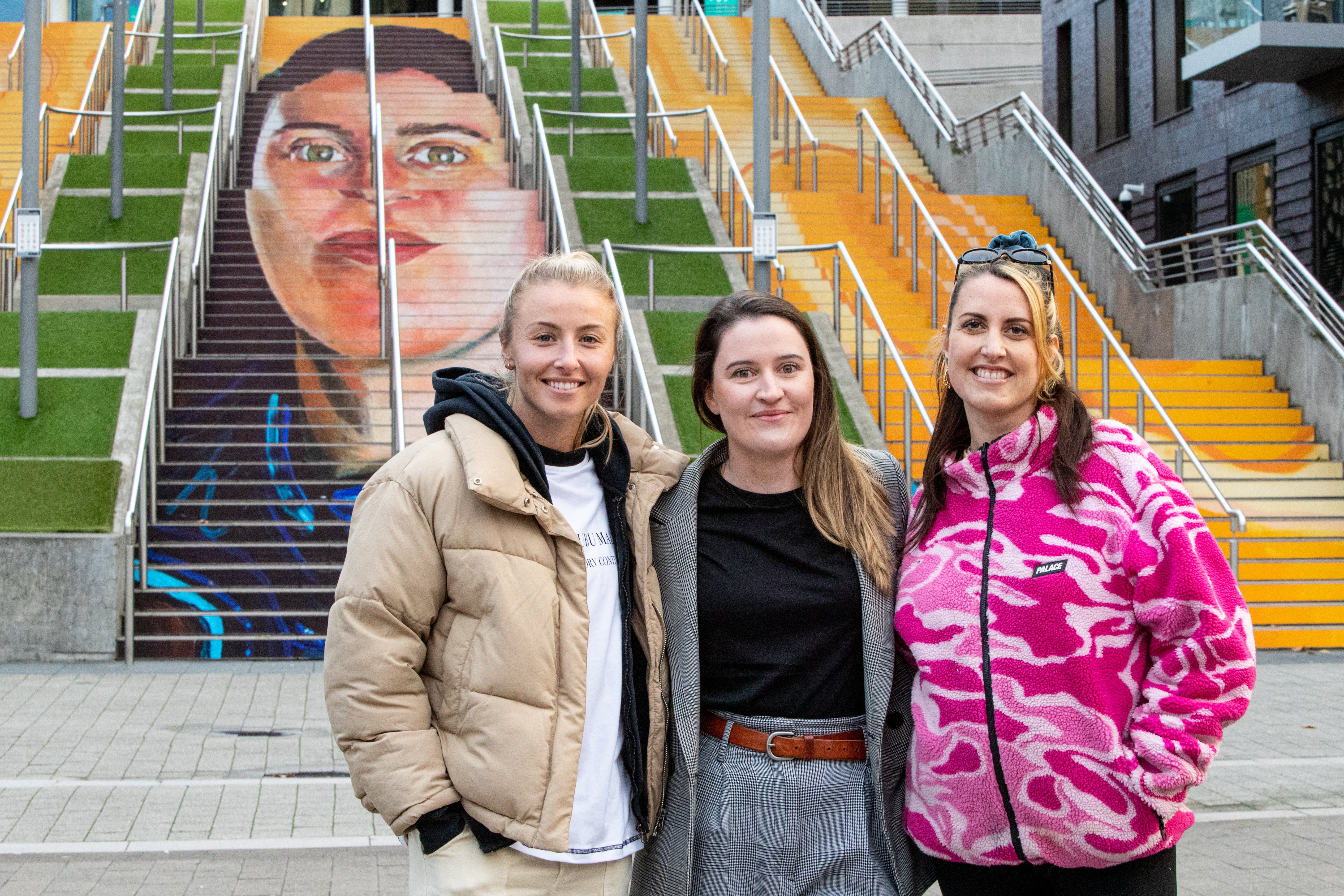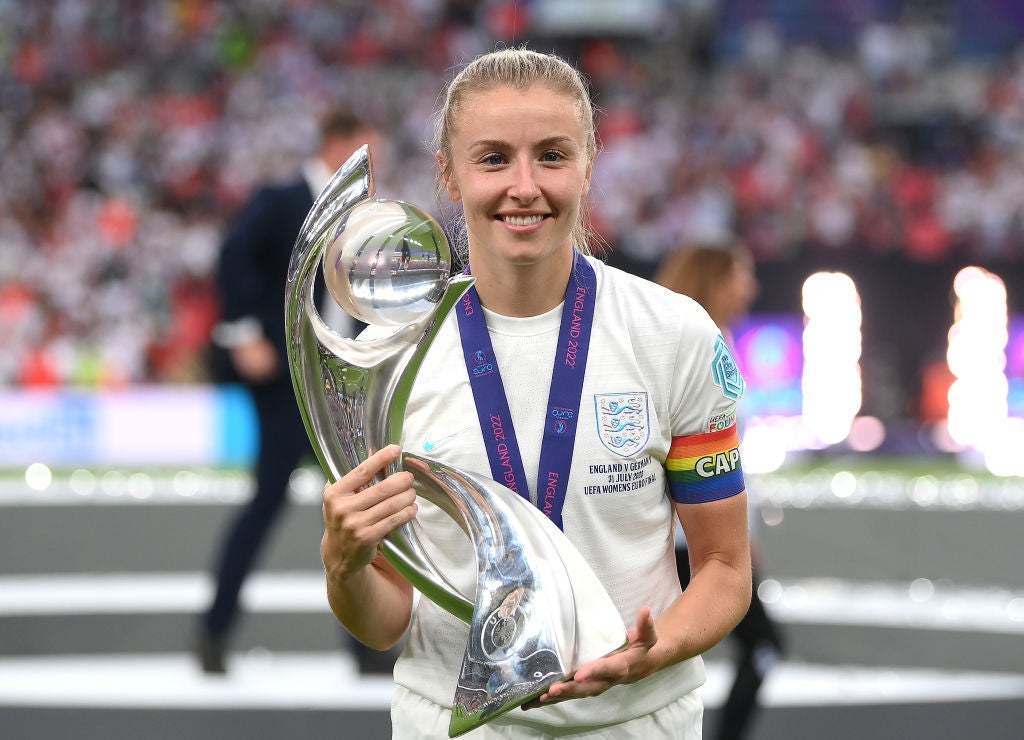
If leadership in football has looked short in recent days, Leah Williamson can help to provide an antidote. The England captain says the staging of the men’s World Cup in Qatar is “wrong” but wants to use her voice to highlight the discrimination of LGBTQ+ people in the host country, while promoting messages of inclusion and equality closer to home.
Armbands, and England’s decision not to follow through with their ‘OneLove’ stance following pressure from Fifa, has been the hot topic of the opening days of the World Cup. In July, Williamson proudly wore her rainbow armband in support of LGBTQ+ rights as the Lionesses won the Euros at Wembley. It was a victory that stood for more than football, celebrated in an environment that was inclusive and diverse.
“I think one of the biggest compliments I’ve had since the Euros is someone went to one of our games when they were afraid to go to a men’s game,” Williamson tells The Indepdendent. “I wouldn’t want anyone to feel like it wasn’t their game. We wanted to show that supporting England is an open invitation to be exactly who you want to be, because that’s what we do too.”
The contrast to Qatar could not be clearer. While the Lionesses were inviting LGBTQ+ fans to support the team, this World Cup has made them feel like they have been turned away. Some England supporters groups, such as Three Lions Pride, have not travelled to the World Cup after not receiving assurances that they would be welcomed in the country. Since the tournament began, Fifa have not only come down on the ‘OneLove’ armband but there have been incidents of fans and journalists being unable to enter stadiums while wearing the rainbow symbol.
“I’ll support England until the day I die but I’m not in support of the tournament,” Williamson says. “The fact that we are here and how we got here is wrong, there’s no other way of putting it. It’s a shame that people either can’t travel or are uncomfortable to watch. They are the ones who feel like they have been alienated in terms of the LGBTQ+ community. It’s not acceptable.”
Williamson was speaking ahead of the start of the World Cup and at the unveiling of a mural depicting Helen Hardy, founder of Manchester Laces - the first inclusive women’s and non-binary football club in Manchester. The artwork, which can be seen when approaching the iconic stairway at Wembley, takes its place at the symbolic home of English football and promotes a message that was key to the Lionesses’ journey last summer.
Williamson lifting the Euros as England celebrated their first major international title in 56 years was one defining image on the pitch but away from it, the 25-year-old wanted their display of solidarity to remain consistent. As the Lionesses captured the attention of the nation and over 22 million tuned in to the historic moment, the significance of the rainbow armband grew as well.
“To do that on a stage where it’s not just women’s football fans who are watching, everyone is watching, it was important to then show the world that’s the way we think it should be,” Williamson says. “Any chance we get to make that point we will do that.”

For Williamson, Manchester Laces embody how football can actually be used as a force for good, particularly at a time when being trans or non-binary in sport and wider society can be difficult. “It’s about normalising what should be normalised,” she says. “Once upon a time it was foreign for a girl to play football and I know that trans people experience [discrimination] in their day to day life, let alone when they want to step into something that they really love.
“It’s a statement. The more we do it, the more we make it normal, the more that filters into society. Football is a great vehicle to do that.”

The Lionesses used the opportunity of a home Euros and Williamson as captain led the way. The Arsenal defender is an impressive leader on a national and international level but hails Hardy and the impact of Manchester Laces as an example of how differences can be made within local communities.
“I’ll never pretend to know everything about everything, that’s self explanatory being 25. I think there’s a consideration with lots of things where if you listen well enough and you speak to people then most of the time you will form your own view and your own opinion, and if you are brave enough to say it out loud then you will help people.
“That’s why I love this campaign, for example, because it’s someone who doesn’t even see themselves as a leader, Helen, deciding to pave the way and something she believes should be available and a space that she believes should be available for people to be able to positively impact the world a little bit.
“On a personal level, Helen to me is an inspiration. I think she does a lot more than I do, which society would tell us isn’t the truth. I’m proud to be a part of the campaign and I’m proud that she has access to this funding from the National Lottery because this is the point. Everyone is helping each other without even knowing it but to see it projected onto the side of Wembley, the home of football, is the place it deserves to be.”
Leah Williamson has teamed up with The National Lottery to honour the work of amazing individuals championing diversity and inclusion in sport like Helen Hardy, founder of Manchester Laces. The campaign shines a light on how the £30m raised a week by National Lottery players goes towards good causes across the UK.







